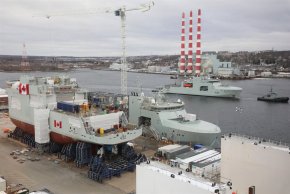You say that as if it's a good thing. When has ownership by government ever been more efficient than private ownership? Private ownership virtually guarantees regular updates of equipment and processes in order to gain efficiencies. These efficiencies will help to reduce costs and increase the profit margin to the shipyard from a fixed-price contract. This should also limit project overruns. That incentive is simply not there with governments. I see more likelihood that a privately owned shipyard will control costs than a government owned shipyard. That does not seem like a terribly great decision to me. I'm genuinely curious as to what the motivation was for this approach?
Mate, yes I do say it’s a good thing, a very good thing. But I don’t think you quite understand why.
We are talking about two separate things working together, on the one side is the Australian Government (via ANI Pty Ltd), as the builder, provider and owner of the infrastructure (probably the most modern naval shipyard infrastructure in the world).
And on the other side, for the Hunter class build, the private company BAE Systems, building those ships.
It is not a Government ‘controlled’ build process, the process of building the ships is in the hands of BAE Systems.
Do you some how believe that ‘every’ private company in the world owns every single building or site they operate on? No they don’t.
I’ve worked for numerous ‘private’ companies that ‘lease’ the site they operate on, why does it matter ‘who’ owns the site or infrastructure you are operating on?
Should BAE Systems also own the roads that lead to the shipyard? Should they own the water and electricity supplies that comes to the shipyard? Where do you draw the line?
When the Hunter class build ends the next project is the replacement DDGs, then it will start over again for a replacement for the Hunter FFGs, and on and on.
The Government plan is for ‘continuous’ naval shipbuilding.
The replacement DDGs might or might not be a BAE Systems design, it could be an Australian design, a Spanish design, Italian design, etc, etc. The one constant will be the modern Government owned shipyard infrastructure.
If BAE Systems wins the next contract, they’ll stay on site, if they don’t, they’ll pack up their desks and move out, and the next builder will move in, utilise the shipyard workers and the infrastructure provided.
I don’t see the problem.
Cheers,



